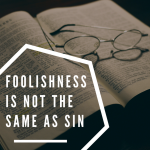My last blog post was all about things that unmarried people shouldn’t do, mainly because they’re acting like they’re married when they aren’t. I tried to point out that the things in themselves weren’t sinful (though they could lead to sin), but instead they were unwise. I’d like to elaborate on that a little bit more because I think we sometimes get confused about that distinction.
Foolishness ≠ Sin
Let me make one thing clear: doing something foolish or stupid isn’t necessarily sinful. There are cases where sin and foolishness collide, but that isn’t always the case. For example, I could stick my hand in the face of a scary looking dog I’ve never seen before. That’s a stupid thing to do, but there’s nothing in the Bible that tells says you shouldn’t stick your hand in a dog’s face. I haven’t sinned. I’ve just done a stupid action which may have very unpleasant results (like getting my hand bitten off).
However, the Bible shows us that there is a long-term connection between foolishness and sin and between wisdom and righteousness. There’s a whole book about it: Proverbs. Much of the book shows that foolishness can easily lead to sin. It opens the door. For example, chapter 7 of Proverbs poetically tells a story about a foolish young man who is flattered and seduced into adultery. He starts out simply as a fool wandering about town, but by the end of the tale he is described as “an ox going to slaughter, like a deer stepping into a noose . . . little knowing it will cost him his life.” Not only does he sin (by committing adultery), but his action leads to his ruin.
How Foolishness Leads to Sin
That seems to be a trend in Proverbs. Fools get themselves into trouble and ruin because they despise correction, wisdom, and prudence. They only listen to themselves and their friends. They’re unwilling to learn, unwilling to listen, and unwilling to become better people. To that extent, foolishness and sinfulness go hand in hand. If you do something stupid and you have a foolish moment, that’s one thing. Maybe you just didn’t know. Maybe you were off that day. However, if you don’t learn anything from that mistake, if you’re not willing to accept correction, you’re not just being foolish, you’re becoming a fool. It’s as much about your actions as it is your attitude.
Attitude ≥ Actions
That should be true of the Christian life in general, but it should definitely be true when it comes to our relationships, both for those that are married and those that are single. If you’re new to Jesus and you’re used to just doing whatever with people you’re dating and you mess up, that’s okay. You’re still learning. You might have had a foolish moment, but as long as you are open to being corrected, you’re not a fool. The same holds true for those that have been Christians for a long time and have a foolish moment.
We need to have a little bit of patience with one another. We shouldn’t call someone sinful when they’ve just done something foolish. One example of this is people who are super gung ho about not kissing until marriage (FYI I used to be one of them). You might think making out with someone you’re dating is foolish (and you might even have a good argument there), but it’s not sinful. It might lead to sin, and it might be prudent to gently and gracefully point that out, but you shouldn’t be condemning.
Grace ≥ Everything
We also have to remember that God’s grace is big enough and strong enough to cover up all of our foolish mistakes and our sinful actions. We shouldn’t beat ourselves up when we do foolish or even sinful things. We shouldn’t beat other people up when they do foolish and/or sinful things either. However, we should be willing to admit when what we’ve done is foolish and to change course. We should be willing to accept correction from godly sources who have our best interests at heart. We should constantly be striving to become wiser. We should also be willing to gently and lovingly tell others when they are potentially being foolish, especially if we are a little further along the walk of life then they are.
The Importance of Listening
That’s the other side of the coin in the book of Proverbs. The wise person is pleasing to God because the wise person listens to God’s word and to correction given by people who are older and wiser. How many of us have people who are older and wiser than ourselves speaking into our lives? How many of us who are older would be willing to speak into the lives of those younger than us? Yet the book of Proverbs shows us the importance of that.
An Aside
Now, I should note that wisdom is not equal to salvation. There’s nothing that says you have to be really wise in order to be saved or that all wise people are saved. However, the book of Proverbs does spur us on to acquire more wisdom and to use that wisdom in a way that is pleasing to God. Just like with spiritual disciplines (which PS is one method to gain more wisdom), wisdom doesn’t save us. It’s possible to get to heaven without tons of wisdom, but wisdom and discipline both help us in this life. They bring us closer to God and help us to live our life in a way that pleases Him.
So what about you, can you tell the difference between sin and foolishness? Could you differentiate between sinful and foolish actions in your lie? Are you seeking after wisdom or are you closed off to correction from others (or from those who think differently and/or are older and wiser than you)? How could you gain more wisdom? After all, “wisdom is more precious than rubies, and nothing you desire can compare with her.” (Proverbs 8:11)
Photo by Aaron Burden on Unsplash

